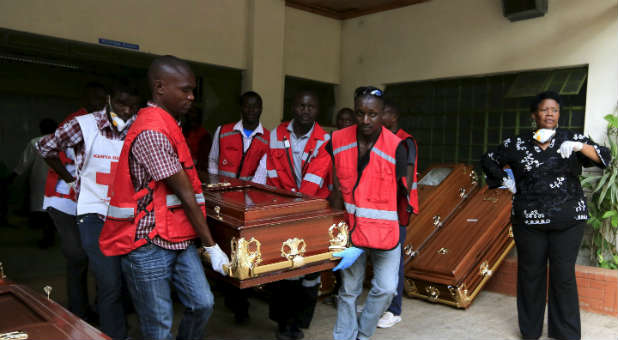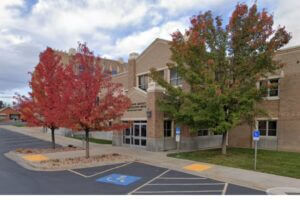Editors Note: This is a next in a series of speech texts from last Friday’s conference at the United Nations titled, “Not Peace but a Sword: The Persecution of Christians in the Middle East as a Threat to International Peace and Security.” Here’s Jamie Peters, who with his wife, spent 25 years building churches and as missionaries on the front line in several African Nations.
Jamie Peters
First of all, I want to thank our hostess, Ugoji Eze, who is the originator of this event and has painstakingly worked to make this meeting a reality. I also wish to thank His Excellency, Ambassador Caleb Otto, for his role in making this historic event come to pass. I do not count this opportunity lightly; words to express my thanks adequately escape me as the gravity of this meeting is great.
Today, I humbly speak before you all as a voice for fellow Christians who are, at this moment, being persecuted for their faith. In times past, such persecution was more or less isolated to more remote and closed parts of the world, but it has now escalated to the point of alarm. Not only are we witness to persecution of Christians in the Middle East, but we are also witness to an increase of persecution against Christians on the great continent of Africa as well. It is interesting to note at this particular juncture that six out of the 11 main jihadi groups in the world are based in Africa. From Boko Haram in Nigeria slaughtering the innocent to al-Shabab infiltrating Kenya and singling out Christians with acts of terror—as we saw in the recent attacks at Garrissa University in Kenya, students who were unable to recite portions of the Quran were executed. In this single act alone 148 lost their lives once again to al-Shabab. This is the same group that murdered 67 men, women and children at the Westgate Mall in Nairobi, Kenya in September, 2013. It is already too late for those who have lost their lives in this senseless violence; how many more will die as we wait for the International Community to speak, to act? If no measures are taken to stop the violence, these groups, and others like them, will continue to sweep across the region and ultimately the continent of Africa and beyond slaughtering and persecuting those whose faith is different from their own.
Today, my heart is heavy for Kenya, indeed for the entire continent of Africa. For far too long, Africa has been plagued by civil war, famine, poverty, tribal unrest, lack of infrastructure, lack of schools, lack of proper medical facilities and the basic necessities for human life. Oftentimes these people are forced to live in conditions where they struggle to simply have water for their families on a daily basis, not to mention the conveniences of electricity that we here in the Western world take for granted. Their struggle has gone unnoticed, forgotten and even ignored. One country, the Democratic Republic of Congo, stands out in my mind as one of the greatest forgotten tragedies of our present day world. Since the early 1990s, the DRC has been plagued by civil unrest, uprisings, and the consequences of such longstanding violence. According to an article, “Chronicle of Death Ignored” published by The Economist in April 2011, 5 million people had died due to the unrest in the DRC—and this number is now 4 years old. The count, undoubtedly, has climbed much, much higher.
I can speak of these conditions today from personal experience, because as missionaries, my family and I lived and worked in Africa for 25 years; from 1987 to 2012 we served as missionaries in the Democratic Republic of Congo, Burundi, Tanzania, Zambia and Malawi.
During this span of 25 years of missionary service, we saw many injustices committed, both by outside nations as well as from inside the nations where we served. Unfortunately, in most cases, we didn’t have a platform to stand on and speak out against these injustices because of the nature of our work. So when this opportunity was presented to me to speak before the International Community of the United Nations and speak out against the injustices and crimes against humanity being committed against Christians around the world, and in particular the continent of Africa, I knew I had to accept.
One particular injustice we saw firsthand while serving in Bujumbura, Burundi, from 1991 to 2000, was the genocide that took place in neighboring Rwanda during that time, where an estimated 1 million people were murdered just for being the wrong tribe—intolerance of massive proportions. In fact, in Burundi we experienced genocide of several hundred thousand as well, around the same time, all for the same reason.
To make the situation in the region more complex, civil war broke out in the Democratic Republic of Congo around the same time as the events that were taking place in Rwanda and Burundi. This created a security vacuum in the Congo because Congo allowed thousands to flee from Rwanda and Burundi into their nation. Among the innocent refugees were many of the ones who committed the atrocities that took place in Rwanda and Burundi. The perpetrators of the genocide are still hiding in the forests of the DRC, many having escaped justice. This has created a volatile situation that continues to exist in the Great Lakes Region of Africa. The ones who suffer the most? Women, children and the elderly—who will speak for them? Who will act for them?
The violence in Rwanda and Burundi was based on ethnic divisions. Two different tribes in Rwanda and Burundi warred against one another simply due to their intolerance of one another. This hatred and intolerance brought them to take up AK-47’s and machetes and use them on one another in an attempt of each tribe trying to annihilate the other tribe. However, much blame is also to be put on the International Community for their injustice committed at that time—an injustice of silence and non-intervention—especially when it had the responsibility and the means to do something about it, but unfortunately, for the most part, it turned a blind eye and did nothing about it—this led to the senseless deaths of nearly 1.5 million people (the total number of deaths in Rwanda and Burundi combined).
One of our dear friends and colleagues in Africa, who has personally experienced these types of atrocities we are addressing in this meeting, sent me the following message upon learning that I would be speaking before you today: “When I heard of your going to the U.N. to speak on the behalf of those who cannot speak, I became suddenly emotional as my thoughts took me back in 1972 when my father was murdered during an ethnic war. The International Community did nothing at that time to stop the senseless murders of thousands of innocent civilians. I have grown up without a father figure. I don’t know what it feels like to have an earthly father. Sometimes I wish I had one … I have never called anyone “Dad” my entire life! Do I miss it? I don’t know because I’ve never been able to experience having a father.
Someone needs to stand up; someone needs to stop the pointless murdering of innocent lives. In so doing, they could possibly save a generation of people from growing up empty, fatherless and motherless. We all have the right to live. Right now dozens of foreigners are being burnt alive in South Africa and no one has dared to say anything. Not assisting someone in danger when you are in a position to do so is as good as committing the crime itself. Please go ahead and speak for us.”
So here we are again where it seems as if history is repeating itself on the continent of Africa, and around the world, as extremists take up the sword and gun. This history is one of intolerance and hatred. Only this time it’s an intolerance and hatred based on religion, but an intolerance and hatred nonetheless. The question that begs to be answered today is this: Will the International Community repeat history by ignoring its responsibility and not using its means to stop the atrocities that are taking place against Christians in Africa, and now in other parts of the world as well, in the name of radical Islamic extremism? The International Community must do something now before it’s too late. Otherwise, the intolerance and hatred of radical Islamic extremists will continue to spread and become a security threat to many regions around the world—as we have already witnessed in certain parts of the world, namely in the Middle East.
In the 1990s Rwanda and Burundi experienced a genocide based on ethnicity. Now in 2015 radical Islamic extremists are trying to carry out another kind of genocide—a genocide based on religion whose goal is to kill as many Christians as they can. And so my appeal today is to the International Community who has the responsibility and the means to not let another genocide take place—please do not let history repeat itself!
It is apparent that radical Islamic extremists are waging a war against Christianity. This must be stopped, not only for the safety and security of millions of Christians around the world, but for society as a whole. Otherwise, the future of every peace-loving member of the world community will be jeopardized. According to one African proverb: “War is a bad chisel with which to carve out tomorrow.”
In conclusion, I would like to speak a blessing in Swahili over our fellow Christians in Africa and around the world who are persecuted for their faith in Christ:
Wakristo wenzetu wa Afrika na wa duniani kote mnaoteseka kwa ajili ya imani yenu katika Kristo, tunasimama pamoja nanyi. Mwenyezi Mungu awalinde na awawezeshe kuendelea kumfuata.
Translation: Our fellow Christians in Africa and around the world who are persecuted for your faith in Christ, we stand together with you. May Almighty God protect you and strengthen you to continue to follow Him.
See an error in this article?
To contact us or to submit an article





















